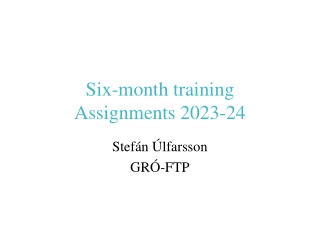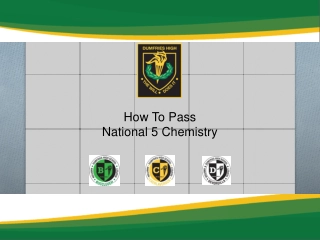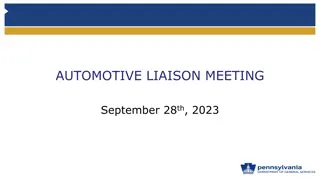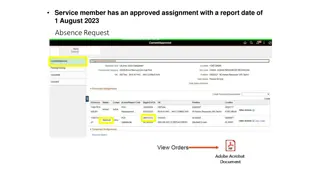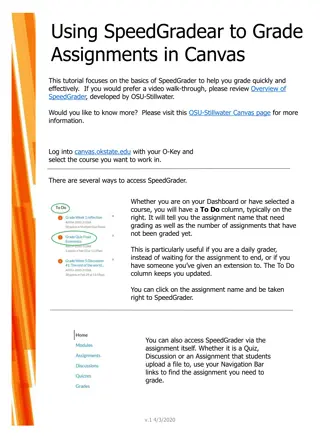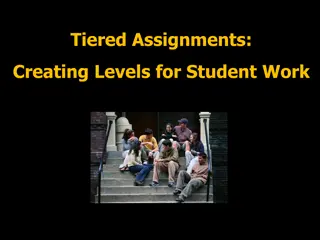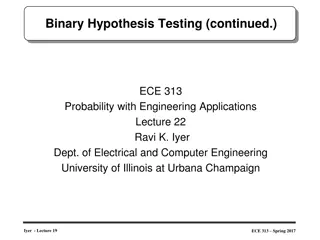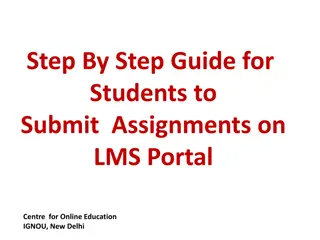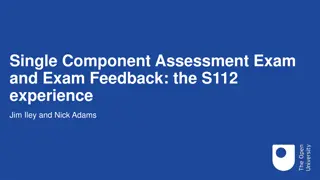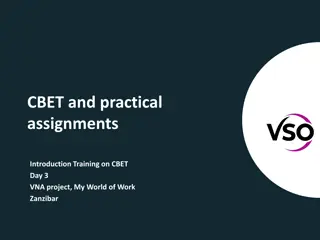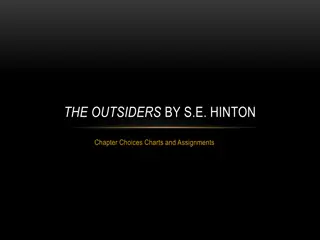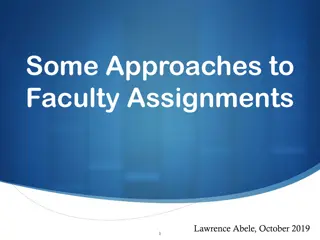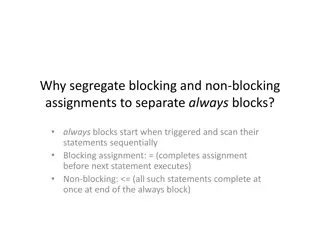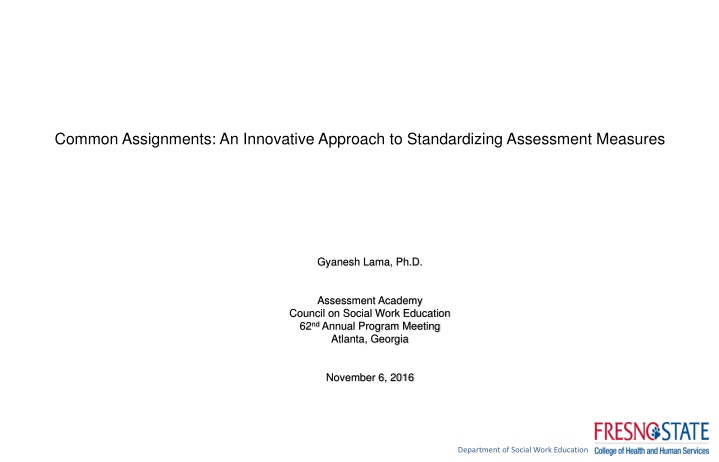
Innovative Approach to Standardizing Assessment Measures in Social Work Education
This presentation discusses a novel approach to standardizing assessment measures in social work education, focusing on developing valid and reliable measures for EPAS competencies and practice behaviors. The aim is to ensure consistency and effectiveness in assessing student learning outcomes in Masters of Social Work programs. The content covers the identification of competencies, setting measurement benchmarks, and reporting assessment outcomes to meet accreditation standards.
Download Presentation

Please find below an Image/Link to download the presentation.
The content on the website is provided AS IS for your information and personal use only. It may not be sold, licensed, or shared on other websites without obtaining consent from the author. If you encounter any issues during the download, it is possible that the publisher has removed the file from their server.
You are allowed to download the files provided on this website for personal or commercial use, subject to the condition that they are used lawfully. All files are the property of their respective owners.
The content on the website is provided AS IS for your information and personal use only. It may not be sold, licensed, or shared on other websites without obtaining consent from the author.
E N D
Presentation Transcript
Common Assignments: An Innovative Approach to Standardizing Assessment Measures Gyanesh Lama, Ph.D. Assessment Academy Council on Social Work Education 62nd Annual Program Meeting Atlanta, Georgia November 6, 2016 Department of Social Work Education
Assessment EPAS Competencies -> Practice Behaviors Problem: Developing a valid and reliable assessment measure of EPAS competencies and practice behaviors. Standardizing the measures across multiple competencies, across multiple programs, multiple courses and sessions, and over time.
Assessment Outcome ASSESSMENT OF STUDENT LEARNING OUTCOMES MASTERS OF SOCIAL WORK PROGRAM 8/31/2016 Form AS 4(M)-Duplicate and expand as needed. Provide table(s) to support self -study narrative addressing Accreditation Standards below. ________________________________________________________________________________________________________________ This form is used to assist the COA in the evaluation of the program s compliance with Accreditation Standards stated below. 4.0.2: The program provides summary data and outcomes for the assessment of each of its competencies, identifying the percentage of students achieving each benchmark. 4.0.4: The program uses Form AS 4 (B) and/or Form AS4 (M) to report its most recent assessment outcomes to constituents and the public on its website and routinely up-dates (minimally every 2 years) these postings. All Council on Social Work Education programs measure and report student learning outcomes. Students are assessed on their mastery of the competencies which comprise the accreditation standards of the Council on Social Work Education. These competencies are dimensions of social work practice which all social workers are expected to master during their professional training. A measurement benchmark is set by the social work programs for each competency. An assessment score at or above that benchmark is considered by the program to represent mastery of that particular competency. PERCENT OF STUDENTS ACHIEVING BENCHMARK MSW FOUNDATION COMPETENCY COMPETENCY BENCHMARK MSW ADVANCED Identify as a Professional Social Worker 90% students will demonstrate this competency 99% 99% Apply Ethical Principles 90% students will demonstrate this competency 96% 98% Apply Critical Thinking 90% students will demonstrate this competency 97% 99% Engage Diversity in Practice 90% students will demonstrate this competency 97% 98% Advance Human Rights/ Social and Economic Justice 90% students will demonstrate this competency 100% 98% Engage Research Informed Practice/ Practice Informed Research Human Behavior Knowledge 90% students will demonstrate this competency 99% 98% 90% students will demonstrate this competency 95% 98% Engage Policy Practice to Advance Well- Being and Deliver Services Respond to Practice Contexts 90% students will demonstrate this competency 97% 98% 90% students will demonstrate this competency 100% 97% Practice Engagement 90% students will demonstrate this competency 98% 97% Practice Assessment 90% students will demonstrate this competency 99% 99% Practice Intervention 90% students will demonstrate this competency 98% 98% Practice Evaluation 90% students will demonstrate this competency 99% 98%
Competencies and Practice Behaviors Educational Policy 2.1.6 Engage in research-informed practice and practice-informed research. CSWE-PB (2008 EPAS) Use practice experience to inform scientific inquiry and Fresno State-PB (AY 13-14) MSW FOUNDATION Use practice experience to inform scientific inquiry. Use research evidence to inform practice. Use research evidence to inform practice. MSW ADVANCED Use advanced practice experiences to inform research at multi systems level. Apply research methods to evaluate multi systems social work practice processes and outcomes.
APPENDIX A: ASSESSMENT PLAN: MSW FOUNDATION Accreditation Standard 4.0.1. The program presents its plan to assess the attainment of each of its competencies. The plan specifies procedures, multiple measures of each practice behavior, and benchmarks employed to assess the attainment of each of the program s competencies. (AS B2.0.3, AS M2.0.4). Following table with explanatory narrative present the MSW PROGRAM S ASSESSMENT plan COMPETENCY COMPETENCY BENCHMARK 90% students will demonstrate this competency PRACTICE BEHAVIOR (PB) PB 1. Use practice experience to inform scientific inquiry MEASURES ASSESSEMNT PROCEDURES (PB) For Measure 1: Students must score a minimum of 3.0 on a scale of 0 - 4.0 OUTCOME MEASURES BENCHMARK Determine the percentage of students that attained the benchmark for each outcome measure. Average the percentages together to obtain the percentage of students demonstrating competence. Determine whether this percentage is larger than the Competency Benchmark. 2.1.6: Engage Research Informed Practice/ Practice Informed Research Measure 1: Common Assignment -- Construct a solid narrative framework for a project or thesis (SWRK 261) For Measure 2: Students must score a minimum of 3.0 on a scale of 1 5. Measure 2: Field Learning Agreement-- Practice Evaluation (EP2) (SWRK 281) Measure 1: Common Assignment -- Literature Review (SWRK 260) PB 2. Use research evidence to inform practice. For Measure 1: Students must score a minimum of 3.0 on a scale of 0 - 4.0 Measure 2: Field Learning Agreement-- Literature Review (EP1) (SWRK 281) For Measure 2: Students must score a minimum of 3.0 on a scale of 1 5.
Common Assignment Definition: Specific assignment developed by faculty who have experience teaching identified content and current knowledge needed to deliver the material associated with the practice behaviors. Common assignments are intended to assess a student s knowledge regarding a practice behavior and function as standardized measurement tools, which assess, at the minimum, one practice behavior that is common across the course sections. Common assignments allow for the comparison of a measure of practice behaviors across course sections that are taught by one or more faculty in a given semester. The objective of the common assignments is to minimize subjectivity in faculty-level and section- level assessment. It is designed to ensure that the observed variations in outcome are due to student performance and not due to the differences in the measurement tool and faculty level subjectivity. Common assignments are designed to measure student mastery of explicit instruction. This mastery is measured using a standardized grading rubric that extracts quantifiable outcome data. Common assignments were designed to measure practice behaviors.
Common Assignment: Example MSW Program SWRK 200: Case Study / Role Play SWRK 200: Final Paper: Globalization and Social Work SWRK 203: Policy Analysis Paper SWRK 203: Policy Brief SWRK 212: Group Paper & Presentation SWRK 212: Multisystem Assessments SWRK 213: Self -Interview Paper SWRK 220: Theoretical Applications to a Culturally Sensitive Practice Situation SWRK 221: Final: Oral & Written Case Presentation SWRK 224: Final Paper: Advanced Culturally Relevant Practice to a Case Study SWRK 225: Final Paper: Advanced Group Lab Analysis SWRK 227: Final Paper: Advanced Multisystem Assessment of a Couple using a Vignette Case Study SWRK 246: Organizational Plan SWRK 246: Organizational Assessment SWRK 247: Community Assessment SWRK 247: Intervention & Evaluation Plan SWRK 260: Literature Review SWRK 261: Project Proposal SW 298/299: Project/Thesis
Common Assignment: Example BA Program SWRK 123: Final Group Activity/Presentation SWRK 123: Reflection Paper: Critical Thinking and Integration of Social Welfare Policy SWRK 135: Life Summary: Understanding Development over the Life Span SWRK 136: Cultural Autobiography SWRK 160: Final Interviewing Skills Exercise SWRK 160: The Self Understanding Paper SWRK 161: Group Project on Assessment Paper and Presentation SWRK 170: Human Subjects and Ethical Issues: How Research Informs Social Work Practice & How Social Work Practice Informs Research SWRK 171: Article Analysis: Research Informed Practice / Practice Informed Research (Using Practice Experience to Inform Scientific Inquiry) SWRK 180: Agency Analysis SWRK 183: Film Critique: Interview Strengths & Challenges SWRK 183: Intervention & Evaluation Plan SWRK 183: Interview Recording SWRK 180: Written Grant Proposal
PROGRAM ID-PBCODE3 Measure 1: COMMON ASSIGNMENT Measure 2; F-ID SWRK 227: Final Paper: Advanced Multisystem Assessment of a Couple using a Vignette Case Study SWRK 225: Final Paper: Advanced Group Lab Analysis SWRK 224: Final Paper: Advanced Culturally Relevant Practice to a Case Study SWRK 227: Final Paper: Advanced Multisystem Assessment of a Couple using a Vignette Case Study SWRK 224: Final Paper: Advanced Culturally Relevant Practice to a Case Study SWRK 247: Intervention & Evaluation Plan SWRK 227: Final Paper: Advanced Multisystem Assessment of a Couple using a Vignette Case Study SWRK 224: Final Paper: Advanced Culturally Relevant Practice to a Case Study SWRK 246: Organizational Assessment SWRK 247: Intervention & Evaluation Plan SW 298/299: Project/Thesis SWRK 246: Organizational Plan SWRK 224: Final Paper: Advanced Culturally Relevant Practice to a Case Study SWRK 247: Community Assessment SWRK 227: Final Paper: Advanced Multisystem Assessment of a Couple using a Vignette Case Study SWRK 246: Organizational Assessment SWRK 246: Organizational Assessment SWRK 247: Community Assessment SWRK 246: Organizational Assessment SWRK 225: Final Paper: Advanced Group Lab Analysis SWRK 247: Intervention & Evaluation Plan SWRK 227: Final Paper: Advanced Multisystem Assessment of a Couple using a Vignette Case Study SWRK 227: Final Paper: Advanced Multisystem Assessment of a Couple using a Vignette Case Study SWRK 224: Final Paper: Advanced Culturally Relevant Practice to a Case Study SWRK 247: Intervention & Evaluation Plan MSWADV MSWADV MSWADV MSWADV2.1.1 PB 1 MSWADV2.1.1 PB 2 MSWADV2.1.2 PB 1 283_PD-1 282_PD2 282_PD6 MSWADV MSWADV MSWADV MSWADV2.1.2 PB 2 MSWADV2.1.3 PB 1 MSWADV2.1.3 PB 2 283_PD-2 282_MS1 283_MS-10 MSWADV MSWADV MSWADV MSWADV MSWADV MSWADV MSWADV MSWADV MSWADV2.1.4 PB 1 MSWADV2.1.4 PB 2 MSWADV2.1.5 PB 1 MSWADV2.1.5 PB 2 MSWADV2.1.6 PB 1 MSWADV2.1.6 PB 2 MSWADV2.1.7 PB 1 MSWADV2.1.8 PB 1 283_PD-1 282_MS5 282_MS3 283_MS-9 282_EP1 282_EP1 282_PD3 283_MS-2 MSWADV MSWADV MSWADV MSWADV MSWADV MSWADV MSWADV MSWADV2.1.8 PB 2 MSWADV2.1.9 PB 1 MSWADV2.1.9 PB 2 MSWADV2.1.10 (a)PB 1 MSWADV2.1.10 (a)PB 2 MSWADV2.1.10 (b)PB 1 MSWADV2.1.10 (b)PB 2 283_MS-7 282_MS3 282_MS10 283_MS-8 282_MS4 282_MS1 283_EP-1 MSWADV MSWADV2.1.10 (c)PB 1 282_MS9 MSWADV MSWADV MSWADV MSWADV2.1.10 (c)PB 2 MSWADV2.1.10 (d)PB 1 MSWADV2.1.10 (d)PB 2 282_MS9 282_EP1 283_EP-2
PROGRAM MSW MSW MSW MSW MSW MSW MSW MSW MSW MSW MSW MSW MSW MSW MSW MSW MSW MSW MSW MSW MSW MSW MSW MSW MSW MSW MSW MSW MSW MSW MSW MSW MSW MSW ID-PBCODE3 MSW2.1.1 PB 1 MSW2.1.1 PB 2 MSW2.1.1 PB 2 MSW2.1.1 PB 3 MSW2.1.1 PB 3 MSW2.1.1 PB4 MSW2.1.1 PB4 MSW2.1.2 PB 1 MSW2.1.2 PB 2 MSW2.1.3 PB 1 MSW2.1.3 PB 2 MSW2.1.3 PB3 MSW2.1.4 PB 1 MSW2.1.4 PB 2 MSW2.1.4 PB 3 MSW2.1.4 PB 3 MSW2.1.5 PB 1 MSW2.1.5 PB 2 MSW2.1.6 PB 1 MSW2.1.6 PB 2 MSW2.1.7 PB 1 MSW2.1.7 PB 2 MSW2.1.8 PB 1 MSW2.1.8 PB 2 MSW2.1.8 PB3 MSW2.1.9 PB 1 MSW2.1.9 PB 2 MSW2.1.10 (a) PB 1 MSW2.1.10 (a) PB 2 MSW2.1.10 (b) PB 1 MSW2.1.10 (b) PB 2 MSW2.1.10 (c) PB 1 MSW2.1.10 (c) PB 2 MSW2.1.10 (d) PB 1 COMMON ASSIGNMENT F-ID SWRK 220: Theoretical Applications to a Culturally Sensitive Practice Situation 280_PD2 280_PD1 281_PD1 280_PD3 281_PD3 280_PD2 281_PD2 280_PD5 280_PD4 280_MS1 281_MS-1 280_EP1 280_MS7 280_PD5 280_PD4 281_MS-2 280_EP3 281_MS-3 281_EP-2 281_EP-1 281_MS-1 281_MS-7 281_MS-3 281_EP-4 281_MS-4 281_MS-3 280_EP3 280_MS-7 281_MS-2 281_MS-1 281_MS-2 281_MS-6 281_MS-6 281_EP-3 280 - PD 1 (Consultation) 280 - PD3 (Participate in Professional Organizations) 281- PD2 (FLE-Professional Use of Self) SWRK 220: Theoretical Applications to a Culturally Sensitive Practice Situation SWRK 220: Theoretical Applications to a Culturally Sensitive Practice Situation SWRK 212: Multisystem Assessments SWRK 212: Group Paper & Presentation SWRK 260: Literature Review SWRK 212: Multisystem Assessments SWRK 213: Self -Interview Paper 280 - PD 4 (Professional Staff Interview) SWRK 200: Case Study / Role Play SWRK 200: Final Paper: Globalization and Social Work SWRK 261: Project Proposal SWRK 260: Literature Review SWRK 212: Multisystem Assessments SWRK 212: Group Paper & Presentation SWRK 200: Case Study / Role Play SWRK 203: Policy Analysis Paper SWRK 200: Case Study / Role Play SWRK 200: Final Paper: Globalization and Social Work SWRK 203: Policy Brief SWRK 220: Theoretical Applications to a Culturally Sensitive Practice Situation SWRK 221: Final: Oral & Written Case Presentation SWRK 221: Final: Oral & Written Case Presentation SWRK 221: Final: Oral & Written Case Presentation SWRK 221: Final: Oral & Written Case Presentation SWRK 220: Theoretical Applications to a Culturally Sensitive Practice Situation SWRK 261: Project Proposal
PROGRAM BA BA BA BA BA BA BA BA BA BA BA BA BA BA ID-PBCODE3 BA2.1.1 PB 1 BA2.1.1 PB 2 BA2.1.1 PB3 BA2.1.1 PB3 BA2.1.2 PB 1 BA2.1.2 PB 2 BA2.1.3 PB 1 BA2.1.3 PB 2 BA2.1.3 PB3 BA2.1.4 PB 1 BA2.1.4 PB 2 BA2.1.4 PB3 BA2.1.5 PB 1 BA2.1.5 PB 2 COMMON ASSIGNMENT F-ID SWRK 183: Film Critique: Interview Strengths & Challenges SWRK 160: The Self Understanding Paper 182_PI-6 181_PI-4 182_PI3 181_PI2 182_VE-1 181_VE2 182_GP-6 182_GP-10 181_GP8 182_GP-1 182_PV-4 182_GP-4 182_PI-1 182_GP-7 181 - PI 2 (Field Student Performance Evaluation Boundary Setting) SWRK 183: Film Critique: Interview Strengths & Challenges SWRK 160: The Self Understanding Paper SWRK 135: Life Summary: Understanding Development over the Life Span SWRK 161: Group Project on Assessment Paper and Presentation SWRK 180: Written Grant Proposal SWRK 135: Life Summary: Understanding Development over the Life Span SWRK 136: Cultural Autobiography SWRK 183: Interview Recording SWRK 123: Final Group Activity/Presentation SWRK 123: Final Group Activity/Presentation SWRK 171: Article Analysis: Research Informed Practice / Practice Informed Research (Using Practice Experience to Inform Scientific Inquiry) SWRK 170: Human Subjects and Ethical Issues: How Research Informs Social Work Practice & How Social Work Practice Informs Research SWRK 135: Life Summary: Understanding Development over the Life Span SWRK 135: Life Summary: Understanding Development over the Life Span SWRK 123: Final Group Activity/Presentation SWRK 123: Final Group Activity/Presentation SWRK 123: Final Group Activity/Presentation SWRK 123: Reflection Paper: Critical Thinking and Integration of Social Welfare Policy SWRK 123: Reflection Paper: Critical Thinking and Integration of Social Welfare Policy SWRK 160: Final Interviewing Skills Exercise SWRK 183: Interview Recording SWRK 180: Agency Analysis SWRK 183: Interview Recording SWRK 183: Interview Recording SWRK 161: Group Project on Assessment Paper and Presentation SWRK 183: Intervention & Evaluation Plan BA BA2.1.6 PB 1 182_EP-2 BA BA BA BA BA BA BA BA BA BA BA BA BA BA BA BA2.1.6 PB 2 BA2.1.7 PB 1 BA2.1.7 PB 2 BA2.1.8 PB 1 BA2.1.8 PB 2 BA2.1.8 PB3 BA2.1.9 PB 1 BA2.1.9 PB 2 BA2.1.10 (a)PB 1 BA2.1.10 (a)PB 2 BA2.1.10 (b)PB 1 BA2.1.10 (b)PB 2 BA2.1.10 (c)PB 1 BA2.1.10 (c)PB 2 BA2.1.10 (d)PB 1 181_EP1 182_GP-3 181_GP3 181_VE1 181_GP6 181_PV3 181_GP5 182_PI-1 181_GP1 182_GP-4 181_GP4 182_GP-3 182_GP-2 181_GP2 182_EP-1
PROGRAM MSW MSW MSW MSW MSW MSW MSW ID-PBCODE3 MSW2.1.1 PB 1 MSW2.1.1 PB 2 MSW2.1.1 PB 3 MSW2.1.1 PB4 MSW2.1.2 PB 1 MSW2.1.2 PB 2 MSW2.1.3 PB 1 PRACTICE-BHAVIORS PB 1. Demonstrate professional behavior, appearance, and communication PB 2. Use social work supervision consultation and training for professional growth. PB 3. Participate in professional social work organization/activity. PB4. Attend to professional roles and boundaries PB 1. Apply strategies of ethical reasoning and existing social workethical code to arrive at principled decisions. PB 2. Recognize and manage personal values in a way that allows professional values to guide practice. PB 1. Analyze models of assessment, prevention , and evaluation to practice at all levels of practice. PB 2. Demonstrate effective oral and written communication in wotking with ind, fam.., groups organizations, communities and colleagues. PB3. Distinguish, appraise, and integrate multiple sources of knowledge, including research-based knowledge, and practice wisdom. PB 1. Recognize and understand how diverse factors intersect and assist in understanding experiences of opression, marginalization, alienation, or creation or enhancement of privlege and power PB 2. Gain sufficient self-awareness to manage the influences of personal biases and values in working with diverse groups PB 3. View themselves as learners and engage those with whom they work as informants PB 1. Understand the forms and mechanisms of opression and discrimination at all system levels PB 2. Advocate for practices that promote human rights and the goals of social and economic justice PB 1. Use practice experience to inform scientific inquiry PB 2. Use research evidence to inform practice. PB 1. Utilize conceptual frameworks to guide the processes of assessment, intervention and evaluation. PB 2. Critique and apply knowledge from liberal arts to undeerstand peerson environment and their interaction. PB 1. Identify and articulate societal values reflected in social welfare policies and programs. PB 2. Analyze, formulate, and advocate for policies that advance social well-being PB3. Collaborate with colleagues and clients for effective policy action PB 1. maintain currency with changing locales, populations, scientific and technological developments, and emerging societal trends to assess the relevancy of service. PB 2. Advocate for change in service delivery and practice to improve the quality of services. PB 1. Use empathy, reflective listening, and other interpersonal skills to effectively engage individuals, families, groups, organizations,and commuities. PB 2. Develop a mutually agreed upon focus of work and identify desired outcomes. PB 1. Collect, organize, analyze, organize, and interpret assessment information form identified system levels PB 2. Develop a mutually agreed upon interventiongoals, objectives, and strtegies at identified systems levels PB 1. Implement practive interventions, including those that are evidence based, to address mutually agreed upon goals/ objectives at identified system PB 2. Facilitate trasition, interruptions, and ending at identified system levels. PB 1. Monitor, analyze and evaluate professional behavior and interventions at indentified system levels. MSW MSW2.1.3 PB 2 MSW MSW2.1.3 PB3 MSW MSW2.1.4 PB 1 MSW MSW MSW MSW MSW MSW MSW MSW MSW MSW MSW MSW2.1.4 PB 2 MSW2.1.4 PB 3 MSW2.1.5 PB 1 MSW2.1.5 PB 2 MSW2.1.6 PB 1 MSW2.1.6 PB 2 MSW2.1.7 PB 1 MSW2.1.7 PB 2 MSW2.1.8 PB 1 MSW2.1.8 PB 2 MSW2.1.8 PB3 MSW MSW MSW2.1.9 PB 1 MSW2.1.9 PB 2 MSW MSW MSW MSW MSW2.1.10 (a) PB 1 MSW2.1.10 (a) PB 2 MSW2.1.10 (b) PB 1 MSW2.1.10 (b) PB 2 MSW MSW MSW MSW2.1.10 (c) PB 1 MSW2.1.10 (c) PB 2 MSW2.1.10 (d) PB 1
PROGRAM MSWADV ID-PBCODE3 MSWADV2.1.1 PB 1 PRACTICE-BHAVIORS PB 1. Demonstrate professional use of self in specific multi systems level interventions. PB 2. Demonstrate commitment to ongoing professional development by understanding one's professional strengths, limitations, challenges and needs, including self-awareness. PB 1. Demonstrate effective engagement with consumers/stakeholders at multi system levels utilizing advanced strengths based approaches. PB 2. Facilitate mutual learning at multi systems levels in planning interventions. PB 1. Demonstrate the ability to systematically assemble and interpret assessment tools. PB 2. Demonstrate continuous assessment and collaboration at relevant systems levels for the development of specific practice outcomes. PB 1. Identify and critically evaluate, select, and apply best practices and evidence-based interventions at multi systems levels. PB 2. Demonstrate collaboration with consumers/stakeholders and/or professionals to address complexities and facilitate sustainable interventions. PB 1. Identify, critically evaluate, select and apply methods for evaluation of practice. PB 2. Use practice outcomes to modify interventions and increase effectiveness at multi systems levels. PB 1. Employ strategies of ethical decision-making to multi systems practice and research. PB 2. Manage personal biases as they intersect with professional knowledge, values and laws in social work practice PB 1. Complete comprehensive assessments using a multi systems perspective. PB 2. Provide effective verbal and written communication in trans disciplinary settings. PB 1. Demonstrate depth in critical analysis of the intersectionality of diversity factors. PB 2. Effectively implement multi systems level interventions that are culturally congruent with the needs of diverse populations. PB 1. Apply knowledge of intersectionality and oppression to guide intervention at multi systems levels. PB 2. Implement advanced practices at multi systems levels that promote human rights and social and economic justice PB 1. Use advanced practice experiences to inform research at multi systems level. PB 2. Apply research methods to evaluate multi systems social work practice processes and outcomes. PB 1. Synthesize and differentially apply theories of human behavior and the social environment to guide practice at multi systems levels. PB 1. Apply current models of advanced policy practice to micro and macro assessments, prevention and intervention. PB 2. Engage in advocacy that advances social and economic well-being on a regional, state, national and/or international level. PB 1. Recognize and assess the context for practice and intervene based on identified socioeconomic, cultural, and technological changes that impact multi systems practice. PB 2. Demonstrate initiative in responding to socioeconomic and political contexts that affect practice. MSWADV MSWADV2.1.1 PB 2 MSWADV MSWADV MSWADV MSWADV2.1.10 (a)PB 1 MSWADV2.1.10 (a)PB 2 MSWADV2.1.10 (b)PB 1 MSWADV MSWADV2.1.10 (b)PB 2 MSWADV MSWADV2.1.10 (c)PB 1 MSWADV MSWADV MSWADV MSWADV MSWADV MSWADV MSWADV MSWADV MSWADV2.1.10 (c)PB 2 MSWADV2.1.10 (d)PB 1 MSWADV2.1.10 (d)PB 2 MSWADV2.1.2 PB 1 MSWADV2.1.2 PB 2 MSWADV2.1.3 PB 1 MSWADV2.1.3 PB 2 MSWADV2.1.4 PB 1 MSWADV MSWADV MSWADV MSWADV MSWADV MSWADV2.1.4 PB 2 MSWADV2.1.5 PB 1 MSWADV2.1.5 PB 2 MSWADV2.1.6 PB 1 MSWADV2.1.6 PB 2 MSWADV MSWADV MSWADV2.1.7 PB 1 MSWADV2.1.8 PB 1 MSWADV MSWADV2.1.8 PB 2 MSWADV MSWADV MSWADV2.1.9 PB 1 MSWADV2.1.9 PB 2
PROGRAM ID-PBCODE3 BA2.1.1 PB 1 BA2.1.1 PB 2 BA2.1.1 PB3 PRACTICE-BHAVIORS BA BA BA PB 1. Demonstrate professional behavior, appearance and communication PB 2. Use social work supervision and practice personal reflection to assure continual professional development PB3. Attend to professional roles and boundaries. BA BA BA BA2.1.2 PB 1 BA2.1.2 PB 2 BA2.1.3 PB 1 PB 1. Apply beginning strategies of ethical reasoning and existing social work ethical code to arrive at principled decisions. PB 2. Recognize and manage personal values in a way that allows professional values to guide practice. PB 1. Identify models of assessment, prevention , intervention and evaluation to practice at all levels of practice. PB 2. Demonstrate effective oral and written communication in working with individuals, families, groups, organizations, communities and colleagues. BA BA2.1.3 PB 2 BA BA2.1.3 PB3 PB3. Distinguish, appraise, and integrate multiple sources of knowledge, including research-based knowledge, and practice wisdom. PB 1. Recognize and understand how diverse factors intersect and assist in understanding experiences of oppression, marginalization, alienation, or creation or enhancement of privilege and power BA BA2.1.4 PB 1 BA BA BA BA BA BA BA BA BA BA BA BA2.1.4 PB 2 BA2.1.4 PB3 BA2.1.5 PB 1 BA2.1.5 PB 2 BA2.1.6 PB 1 BA2.1.6 PB 2 BA2.1.7 PB 1 BA2.1.7 PB 2 BA2.1.8 PB 1 BA2.1.8 PB 2 BA2.1.8 PB3 PB 2. Gain sufficient self-awareness to manage the influences of personal biases and values in working with diverse groups PB3. View themselves as learners and engage those with whom they work as informants. PB 1. Understand the forms and mechanisms of oppression and discrimination at all system levels PB 2. Advocate for practices of human rights and the goals of social and economic justice PB 1. Begin to use practice experience to inform scientific inquiry PB 2. Begin to use research evidence to inform practice. PB 1. Utilize conceptual frameworks to guide the processes of assessment, intervention, and evaluation PB 2. Critique and apply knowledge from liberal arts to understand person environment and their interaction. PB 1. Identify and articulate societal values reflected in social welfare policies and programs. PB 2. Analyze, formulate, and advocate for policies that advance social well-being PB3. Collaborate with colleagues and clients for effective policy action. PB 1. Understand changing locales, populations, scientific and technological developments, and emerging societal trends to assess the relevance of service. PB 2. Advocate for change in service delivery and practice to improve the quality of social services. PB 1. Use empathy, reflective listening, and other interpersonal skills to effectively engage individuals, families, groups, organizations, and communities. BA BA BA2.1.9 PB 1 BA2.1.9 PB 2 BA BA2.1.10 (a)PB 1 BA BA2.1.10 (a)PB 2 PB 2. Develop a mutually agreed upon focus of work and identify desired outcomes BA BA2.1.10 (b)PB 1 PB 1. Collect, organize, analyze, and interpret assessment information from identified systems levels BA BA2.1.10 (b)PB 2 PB 2. Develop mutually agreed upon intervention goals, objectives, and strategies at identified systems levels PB 1. Implement direct and indirect practice interventions, including those that are evidence based, to address mutually agreed upon goals/objectives at identified system PB 2. Facilitate transition, interruptions, and endings at identified systems levels. BA BA BA2.1.10 (c)PB 1 BA2.1.10 (c)PB 2 BA BA2.1.10 (d)PB 1 PB 1. Monitor, analyze and evaluate professional behavior and interventions at identified systems levels.
PROGRAM BA BA BA BA BA BA BA BA F-ID FIELD 181_EP1 181_GP1 181_GP2 181_GP3 181_GP4 181_GP5 181_GP6 181_GP8 181 EP 1 (Administrative data analysis) 181- GP 1 (Ability to engage) 181- GP 2 (Problem Solving Model) 181-GP 3 -(Apply social systems model) 181- GP 4 (Assessment of Agency) 181 GP 5 (International agency) 181 - GP 6 (Community meeting) 181 - GP8 (Field Evaluation-Grant Proposal) BA BA BA BA BA BA BA BA BA BA BA BA BA BA BA BA BA BA BA BA BA BA 181_PI2 181_PI-4 181_PV3 181_VE1 181_VE2 182_EP-1 182_EP-2 182_GP-1 182_GP-10 182- GP 10 (Documentation) 182_GP-2 182- GP 2 (Problem Solving Model) 182_GP-3 182- GP 3 (Assessment of Client/consumer) 182_GP-3 182- GP3 (Client/Consumer Assessment) 182_GP-4 182- GP 4 (Culturally relevant plan) 182_GP-4 182- GP 4 (Field Evaluation Mutual Planning) 182_GP-6 182- GP 6 (Eco map) 182_GP-7 182 - GP 7 (Multidisciplinary meeting) 182_PI-1 182- PI 1 (Impact of agency policies) 182_PI-1 182, PI 1 (Impact of agency policies) 182_PI3 182- PI3 (Field Evaluation Professional Roles) 182_PI-6 182-PI 6 (Professionalism in conduct) 182_PV-4 182- PV 4 (Apply mutuality, respect) 182_VE-1 182-VE 1 (Apply NASW Code) 181 - PI 2 (Field Student Performance Evaluation Boundary Setting) 181-PI 4 (Prepare for supervision) 181_PV3 (Field Evaluation Agency Guidelines) 181- VE 1 (Code of Ethics) 181-VE 2 (Values exercise) 182 EP 1 (Outcome evaluation of consumer services) 182 EP 2 (Literature review) 182- GP 1- Engage effectively with diverse clients
PROGRAM MSW MSW MSW MSW MSW MSW MSW MSW MSW MSW MSW MSW MSW MSW MSW MSW MSW MSW MSW MSW MSW MSW MSW MSW MSW MSW MSW MSW MSW MSW MSW F-ID FIELD 280_EP1 280_EP3 280_EP3 280_MS1 280_MS7 280_MS-7 280_PD1 280_PD2 280_PD3 280_PD4 280_PD4 280_PD5 280_PD5 281_EP-1 281_EP-2 281_EP-3 281_EP-4 281_MS-1 281_MS-1 281_MS-1 281_MS-2 281_MS-2 281_MS-3 281_MS-3 281_MS-4 281_MS-6 281_MS-6 281_MS-7 281_PD1 281_PD2 281_PD3 280 - EP 1 (Evaluation of Practice) 280 - EP 3 (Advocating for Services) 280 - EP 3 (Evaluate Practice) 280 - MS 1 (Biospychosocial Assessment) 280 - MS 7 (Ethnograpahic Interview) 280 - MS 7 (Ethnographic Interviewing) 280 - PD 1 (Consultation) 280 - PD 2 (Profession Conduct) 280 - PD3 (Participate in Professional Organizations) 280 - PD 4 (Interview Professional Staff) 280 - PD 4 (Professional Staff Interview) 280 - PD 5 (Conduct Ethics Audit) 280 - PD 5 (Self Awareness) 281 - EP 1 (Literature Review) 281 - EP 2 (Practice Evaluation 281 - EP 3 (Evaluation of Change) 281 - EP 4 (Program / Policy Assessment) 281 - MS 1 (Biosychosocial Assessment) 281 - MS 1 (Multidimensional Assessment) 281 - MS 10 (Verbal and/or Written Assignment) 281 - MS 2 (Culturally Relevant Service Plan) 281 - MS 2 (Culturally Relevant Service Plans) 281 - MS 3 (Assessment of Organizational Structure) 281 - MS 3 (Interventtion Plan) 281 - MS 4 (FLE-Plan regarding Access to Services) 281 - MS 6 (Social Work Services 281 - MS 6 (Social Work Services) 281 - MS 7 (Foundation Social Work Services) 281 - PD 1 (Supervision Participation) 281-PD2 (FLE-Professional Use of Self) 281 - PD 3 (Participate in Professional Organizations)
PROGRAM F-ID FIELD 282 - EP1 - Select & apply an appropriate research methodology experience to inform research at multi systems levels. 282- EP 1- Evaluation of Group Practice 282- EP 1-Evaluation of Independent Practice 282- MS 1 MD Assessment 282- MS 1-MD Assessment 282- MS 10-Administration Management 282- MS 3-Assessment 282- MS 3-Organizational Assessment 282- MS 4-Mututal Service Planning 282- MS 5-Practice and Individuals 282- MS 9 Advanced Practice Approaches 282- MS 9-Advanced Practice Approaches 282- PD 2 Professional Self Awareness 282- PD 3-Theoretical Framework 282- PD 6 Ethical Dilemma 283- EP 1-Evaluation of Family Practice 283- EP 2-Evaluation of Community Practice 283- MS 10-Case Summary/ Policy Analysis 283- MS 2 -Needs Assessment 283- MS 7-Multiple Practice rules 283- MS 8-Process Recording 283- MS 9-Advanced practice methods 283- PD 1 - Professional Use of Self 283- PD 1-Professional Use of Self 283- PD 2 Ethics Consult MSWADV MSWADV MSWADV MSWADV MSWADV MSWADV MSWADV MSWADV MSWADV MSWADV MSWADV MSWADV MSWADV MSWADV MSWADV MSWADV MSWADV MSWADV MSWADV MSWADV MSWADV MSWADV MSWADV MSWADV MSWADV 282_EP1 282_EP1 282_EP1 282_MS1 282_MS1 282_MS10 282_MS3 282_MS3 282_MS4 282_MS5 282_MS9 282_MS9 282_PD2 282_PD3 282_PD6 283_EP-1 283_EP-2 283_MS-10 283_MS-2 283_MS-7 283_MS-8 283_MS-9 283_PD-1 283_PD-1 283_PD-2
DATA MANAGEMENT and ANALYSIS 1.Common Assignment Data: Qualtrics 2.Field Data: IPT Merging and Analyzing Data: 1. Calculate Percent Distribution: Use SPSS for Field Data (tips: use syntax) 2.Develop a Unique Code that will link EPAS to Common Assignment and Field Data 3.Build a Access Database 4.Merge Common Assignment and Field Data using Query Design 5.Build series of query designs to produce desired reports
percent A+B CA-ID CA A B C D F TOTAL A+B 11: SWRK 183: Film Critique: Interview Strengths & Challenges 11 9 5 0 0 0 14 14 100% 11: SWRK 183: Film Critique: Interview Strengths & Challenges 11 14 5 0 0 0 19 19 100% 11: SWRK 183: Film Critique: Interview Strengths & Challenges 11 7 12 3 0 0 22 19 86% 11: SWRK 183: Film Critique: Interview Strengths & Challenges 11 12 10 4 0 1 27 22 81% 12: SWRK 183: Intervention & Evaluation Plan 12 11 3 0 0 0 14 14 100%
Colleagues, This is a gentle reminder that please enter your common assignment grades as early as you finished grading. Please go to the following link and follow the instruction to enter grades for your common assignments. Please enter the grades for all the common assignments. If you have more than one common assignment, you will need to enter grades for each of them separately. Please repeat the steps. The system will not allow you to move forward if the entry is not complete. https://fresnostate.co1.qualtrics.com/jfe/form/SV_01j09EOLkvoDYHP Test runs show that it only takes, on average, 27 seconds to enter the requested data per common assignment on the above link. I hope you will not mind taking two minutes of your time to enter your data. This is a requirement for CSWE Assessment Reporting. All common assignment data must be collected. The grades must be entered before May 30th. Thank you for your cooperation. Should you have any questions, please do not hesitate to let me know.
STRENGTH 1.Fairly easy to implement 2.Instruments are standardized, considered valid and reliable 3.Common Assignments could be simulations 4.Quick turn-around 5.Data can be used for other assessments: GE, SOAP, Annual Report 6.Potential for automation
WEAKNESS 1.Fairly lengthy process to decide on the Common Assignments and Rubrics 2. Academic freedom: not all faculty are fan of standardized system 3. Good amount of database design and analyses skills needed 4. Some manual adjustments are needed, not complete automation

